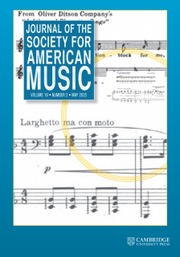No CrossRef data available.
Article contents
Abstract
In November 1966 composer and improviser Bill Dixon recorded a seventeen-minute-long “voice letter” to jazz writer Frank Kofsky. This letter may be analyzed as a critical intervention by Dixon, an attempt to change the context of interpretation around improvised music. But the voice letter may also be heard and analyzed as a kind of performance. As Dixon speaks, one can hear the rumbling and roar of the city as well as the staccato sounds of car and truck horns unfolding in dynamic counterpoint to his words. In this essay, I put the voice letter into dialogue with Dixon's personal history, his writings and interview statements, and some of his contemporaneous musical and multi-generic projects, especially his collaboration with dancer and choreographer Judith Dunn. I show how the letter maps Dixon's and Dunn's positions within a geography of intellectual circles, experimental artistic communities, and low-wage employment networks. By extension, I examine how the voice letter, as critical intervention and performance, points us to a nuanced understanding of black experimental music of the 1960s as a socially inflected, self-conscious and, ultimately, serious engagement with various modes of artistic production and thought, carried out under conditions of both precarity and inspiration.
- Type
- Research Article
- Information
- Copyright
- Copyright © The Society for American Music 2015


